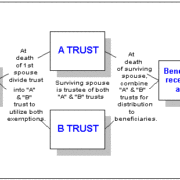Cleveland, Ohio estate planning attorney, Daniel A. Baron, offers the following helpful answers to Powers of Attorney:
What is a Power of Attorney?
A Power of Attorney is a legal document you use allowing another designated person, of your choosing, to act on your behalf. It is a legal relationship in which you are the principal and the person you appoint is the agent. A Power of Attorney outlines specific powers you give to your agent. The powers can be limited or broad. An example would be, you are selling your house, but are not able to attend the closing. You can at that point give someone the power just to sign the deed in your absence. Keep in mind that most durable powers of attorney, give your agent the power to do almost anything you could or would do. In this example you may just limit the function of the Power of Attorney’s duties.
Some financial institutions, brokerage firms, or banks may require you to sign one of their own company specific Power of Attorney for their files.
Why do I need a Power of Attorney?
In the event you become unable to handle your own affairs as a result of illness, accident, or even being absent due to your job, the Power of Attorney gives your agent the power to handle your financial affairs as you would handle them yourself. Since you might not be able to execute a Power of Attorney at a time when you are disabled due to an accident or become incapacitated, or should you become unable to handle your own affairs and have no Power of Attorney, your spouse or family may have to request the Probate Court to appoint a power of attorney on your behalf. A Power of Attorney can be very helpful to both you and your family, as by naming your own agent and having a signed Power of Attorney avoids the expense of probate court and avoids naming someone who may not know and carryout your wishes.
Where should I keep my Power of Attorney?
As your Power of Attorney is an important legal document, it is recommended that you keep it in a safe and secure place. You may also want to give a copy to your agent(s) or in a safe and secure place where it can be easily found by your acting agent. Your agent may also keep a copy in case yours is lost. It is also wise to make sure your family knows where to find your Power of Attorney, or whom to ask when it is needed. And of course, your attorney will have a copy of the Power of Attorney.
What does “durable” mean?
The legal definition of ‘durable’ means the Power of Attorney will remain in effect even if the principal becomes mentally incapacitated. The powers you give to your agent will remain effective even though you are unable to give your agent updated instructions. If you have an older power of attorneys or an out of state powers of attorney, many of these still have these words, and remain in effect.
When does the Power of Attorney take effect?
The Power of Attorney becomes effective immediately upon signing the document before two witnesses and having it notarized. The agent is able to use the Power of Attorney as soon as he or she receives it. However, you may give the Power of Attorney to your agent(s) and tell the person(s) NOT to use it unless you are unconscious or unable to act for yourself. It is imperative that you know and trust the person you are asking to be your Power of Attorney.
You may opt to use a “springing” Power of Attorney which would not take effect until a specific triggering event happens, such as you become incapacitated. However, there are several issues with springing Powers of Attorney. The agent first needs an affidavit showing the triggering event has occurred before the Power of Attorney can be put into use. Then, even though the law says banks and other institutions that accept the document with the affidavit are not liable, banks have been reluctant to recognize the agent’s power under a springing Power of Attorney. Ultimately, it isn’t clear whether such a document would be accepted in other states other than your own.
Does giving someone a Power of Attorney mean I don’t have control over my money any longer?
It does not. Although you still have the right to control your money and property after a Power of Attorney has been put in place, keep in mind, you are giving your agent the ability to access your money. Although there is a risk that a dishonest or unscrupulous agent might steal your money, your agent is not supposed to use your funds in any manner with your permission. It is therefore vital to choose an agent you trust. A sound idea would be to go over the agent’s duties before you sign your power of attorney.
Do I need to update my Power of Attorney if nothing has changed?
It is always a good idea to review your Power of Attorney periodically to make sure you still agree with your choices.
There are some banks, brokerage firms, and other financial institutions that will attempt to reject a Power of Attorney that is several years old. This is mainly due to the possibility that the Power of Attorney has been revoked. This is a good thing, so that an unscrupulous agent that had their Power of Attorney duties revoked, does not gain access to your funds and deplete them. There are several options to prepare for this. If you remain competent it is very wise to re-execute your Power of Attorney every five years or so.
If unfortunately, you are no longer competent; your agent can sign an affidavit that your power of attorney is in full force and in effect and provide that to the financial institution.
A Power of Attorney is only one of the many parts to a comprehensive estate plan. For information regarding living wills, trusts, power of attorney, or a pour-over will, or further questions on Powers of Attorney, contact Daniel A. Baron of Baron Law today at 216-573-3723.
















